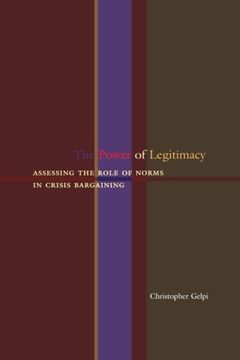Share
The Power of Legitimacy: Assessing the Role of Norms in Crisis Bargaining (in English)
Christopher Gelpi (Author)
·
Princeton Univ Pr
· Paperback
The Power of Legitimacy: Assessing the Role of Norms in Crisis Bargaining (in English) - Christopher Gelpi
$ 35.00
$ 47.50
You save: $ 12.50
Choose the list to add your product or create one New List
✓ Product added successfully to the Wishlist.
Go to My WishlistsIt will be shipped from our warehouse between
Friday, May 17 and
Monday, May 20.
You will receive it anywhere in United States between 1 and 3 business days after shipment.
Synopsis "The Power of Legitimacy: Assessing the Role of Norms in Crisis Bargaining (in English)"
A major departure from mainstream security studies, this book mounts a thoughtful challenge to realist theories of crisis bargaining. It tests the proposition that normative standards of behavior influence state actions in security-related conflicts. Specifically, it examines the construction of bilateral norms as the settlements of security-related disputes and the effects these settlements have on subsequent interactions over the same issue.Drawing on institutionalist arguments about the informational impact of norms, Christopher Gelpi contends that norms act as signals that give meaning to other states' behavior in at least two important ways. First, they provide a mutually acceptable focal point for limiting both demands and concessions. Second, security norms change the context in which coercive behavior is interpreted. That is, norms can cause coercive behavior to be interpreted as punishment rather than aggression.Gelpi tests this argument against its most prominent competitor--a realist model of crisis bargaining--in three stages. First, he uses a probit analysis to perform a quantitative test on the population of 122 reinitiated international crises between 1929 and 1979. Second, he conducts detailed case studies of the Cienfuegos Submarine Conflict and the Six Day War. Finally, he conducts a second statistical analysis examining the conditions under which security norms will succeed or fail. While hypotheses derived from realist coercion theory receive only mixed support, Gelpi finds strong evidence that states can and do construct normative standards that guide their behavior in international crises.
- 0% (0)
- 0% (0)
- 0% (0)
- 0% (0)
- 0% (0)
All books in our catalog are Original.
The book is written in English.
The binding of this edition is Paperback.
✓ Producto agregado correctamente al carro, Ir a Pagar.

